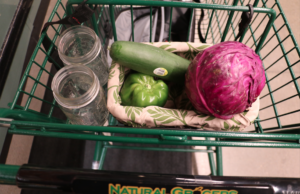Living Green: Simple ways to help the environment and why you should care
With President Barack Obama’s current words and actions about climate change all over the news, you may be thinking about how what you do impacts the environment. We have been told since elementary to reuse, reduce, recycle, but there are many more steps you can take to be more eco-friendly.
With summer coming up, many of us are also probably looking to be a little healthier, and luckily, the two usually go hand in hand. “Turns out, adopting simpler, earth-friendly health and fitness routines had a bigger impact on my overall well being than any high-tech product ever did,” Alden Wicker, a NYC based health journalist, said.
Wicker cited actions as simple as shopping at the farmers’ market, which is very easy to do here in Cedar Falls. There are five different farmers’ markets in the Cedar Falls-Waterloo area throughout the week, the most popular being the Downtown Cedar Falls Farmers’ Market, located on third street between Franklin and Clay.
Not only is it fun to peruse a farmers’ market, there are so many more benefits than meet the eye. Farmers’ markets enable local farmers to sell their produce back into their community, helping the local economy. Also, farmers’ markets reduce the transportation distances of food, and thus the carbon emissions that go along with transporting food. The Council of the Environment of New York City highlights the situation in New York and how farmers’ markets are of great importance: “Transporting food long distances uses tremendous energy: it takes 435 fossil-fuel calories to fly a five calorie strawberry from California to New York.”
If you buy produce from Hoffman’s Farm in Waterloo at the Cedar Falls Farmers’ Market, think of how much better that is for the environment than buying vegetables flown in from California.
You may be thinking, “So what? So what if I shop at the Farmers’ Market? They are still going to transport food for long distances.” This is true. There will still be produce from California and different countries being transported all over the world, whether or not you shop at the Farmers’ Market or care about the environment. But, the simple matter is that every time you buy something, you cast a vote for how our food is produced. Buying locally grown food is voting for a more environmentally conscious future. Local environment expert Kamyar Enshayan said, “Buy fresh, buy local when you can. It is all about supporting, building, and appreciating our region’s food web and all who are involved.”
Buying locally grown isn’t the only way to personally help reduce carbon emissions. The most obvious way, but also one of the hardest in our car-dependent society, is to choose alternatives to driving and reduce driving time. With the beautiful upcoming summer weather and the plethora of bike trails in Cedar Falls, riding your bike wherever you need to go is easier than ever. Biking and walking adds exercise into your day, contributing to your personal health as well as the environment’s health. Senior Brian Keiser rides his bike to school everyday. Keiser said, “I like biking because it is super neat and better than driving those wasteful car things.” Junior Merlin MacGillivray also takes an environmentally-conscious approach to transportation, walking to and from school and carpooling with friends. “We should make cars illegal and just have the biggest public transportation system in the entire world. Cars pollute and kill people, and we spend so much money on them and the highway system. We are freaking out about oil but keep using inefficient cars that take up too much space and use too many resources,” MacGillivray said. If you have to go shopping or buy things that you cannot fit on your bike, combine your errands. This saves both gas and time: good for your wallet, but more importantly, good for the environment.
The Organization Carbon Fund attempts to fight climate change by reducing carbon emission. “A lot of our emissions come from just being inefficient or not deliberate with our daily decisions. Every day think about how you could reduce the miles you drive and pretty soon you’ll start identifying lots of opportunities,” the organization suggests.
Now back to the mnemonic device that was sung, memorized and chanted in elementary school: reduce, reuse, recycle. With food packaging, you can do all three.
Some of us are going to college next year and will be buying our own food, and many of us bring our own lunches to eat in the Tigers’ Den. The Environmental Protection Agency’s Guide to Reducing Wasted Food & Packaging said, “Together, food and packaging/containers account for almost 45 percent of the materials landfilled in the United States.”
Compared to other types of waste, food packaging is quite easy to reduce. And think about how much we could reduce all the waste landfilled if we took initiative with food packaging. Here are some tips on how to reduce food packaging waste: buy items in bulk to reduce the packaging used to make them (instead of the personal mac and cheese containers for lunch, make a batch at home and bring it in Tupperware containers to school), use loose tea instead of tea bags (small, but it makes a difference), reuse your containers (glass peanut butter jar? Use it to hold your pencils!), and, of course, recycle whatever you can (pun because you can recycle pop cans). Next time you order Chinese at home, ask the restaurant not to include napkins or plastic utensils. You can just use what you have at home and forgo the waste.
The Environmental Working Group is a national organization that works to help the environment, especially through the reduction of toxic chemicals and toxic chemical waste. While this may sound like a large scale mission, the Environmental Working Group says one of the easiest ways to reduce your personal contributions to chemical waste is by using “green” cleaning and laundry products. Though this is more applicable to the seniors who will be buying their own stuff in college, you can also always encourage your parents to buy products like “Ecover Laundry Powder” or “Eco-Me Laundry Soap.” Being around less chemicals is good for you, and using less chemicals is good for the environment.
All of these steps are small things you can do to help the environment. Though they may seem insignificant in the big scheme of climate change and national landfills, if we all take initiative to make a positive, eco-friendly change, it can make a difference for a healthier world and a healthier you. As President Obama said, “That bright blue ball rising over the moon’s surface, containing everything we hold dear—the laughter of children, a quiet sunrise, all the hopes and dreams of posterity—that’s what’s at stake. That’s what we’re fighting for. And if we remember that, I’m absolutely sure we’ll succeed.”









You must be logged in to post a comment Login